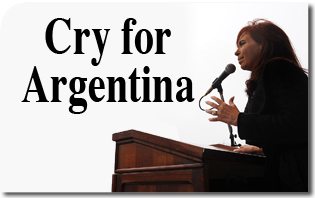 Evita Peron once said, “One cannot accomplish anything without fanaticism.” If fanaticism can be defined as enthusiasm not guided by principles, then it appears that today’s Argentina is following in Evita’s footsteps. Its president, Cristina Kirchner, has just taken the fanatically and unprincipled move of stealing the majority stake in the country’s largest oil company, YPF, from the Spanish firm Repsol.
Evita Peron once said, “One cannot accomplish anything without fanaticism.” If fanaticism can be defined as enthusiasm not guided by principles, then it appears that today’s Argentina is following in Evita’s footsteps. Its president, Cristina Kirchner, has just taken the fanatically and unprincipled move of stealing the majority stake in the country’s largest oil company, YPF, from the Spanish firm Repsol.
In August of 2011, Kirchner stated that “equality and freedom” and “defending the country’s interests” were among the most important priorities as President.1 It seems that equality and freedom do not apply to Repsol.
Repsol owned 57% of YPF when Kirchner simply stepped in this month and took 51%. It is interesting to note that YPF was actually privatized by a previous Peronist administration in 1990. It was legitimately sold to Spain’s oil giant Repsol. Now claiming that YPF belongs to Argentina, the government has “unprivatized” the company by confiscating all but 6% of Repsol’s stake in YPF.
This abuse of authority has provoked outrage in Madrid, coupled with threats of retaliation. Such arbitrary measures are also scaring off businesses that might invest in the country. Spanish company, New Network Solutions (N2S), for example, has cancelled plans to open up offices in Argentina.
N2S managing director Francisco De La Peña told The New York Times “Argentina really looked like a very attractive market for us and we believed it was serious in its commitment to foreign investment — until Monday’s decision.”
Such nationalization of industry is hardly new to the Argentine president. In 2008, Kirchner was responsible for nationalizing Argentina’s private pension program along with its largest airline, Aerolineas Argentinas. Neither of these has done well financially since that time. Her economic policies have proven detrimental to investment, leading to double-digit inflation and capital flight that nearly doubled from $11.4 billion in 2010 to $21.5 billion in 2011.
The investment climate is further complicated by manipulated inflation and economic data to the point where, The Economist has announced that it will no longer publish “official” Argentine statistics. “We are tired of being an unwilling party to what appears to be a deliberate attempt to deceive voters and swindle investors.”2
Both Cristina Kirchner and her late husband and predecessor, Néstor Kirchner, imposed a labyrinth of nationally imposed price controls and government subsidies that makes foreign investment unappealing.
The result is a false notion of equality that merely steals from those who have property to support government policies that supposedly help the poor but more often than not, enrich government bureaucrats. Robin Hood was wrong. One cannot steal from the rich under the guise of doing good for the poor. This is not equality, it is stealing. It is in fact, the distribution of misery.
In an article from The Wall Street Journal, The Inequality Obsession,3 Holman Jenkins writes; “If it were learned that the car driven by the average American is 10 times more likely to burst into flames than the car driven by the richest 1%, what should the policy response be? Should it be to mandate that cars driven by the rich burst into flames more often?”
This seems to be exactly what President Kirchner is doing — spreading the misery. The closer Argentina strays toward socialism, the deeper she will sink into desolation and chaos. Perhaps someday, Argentina will come to her senses and see that there is no free ride. Until then, we can only pray and cry for Argentina.

